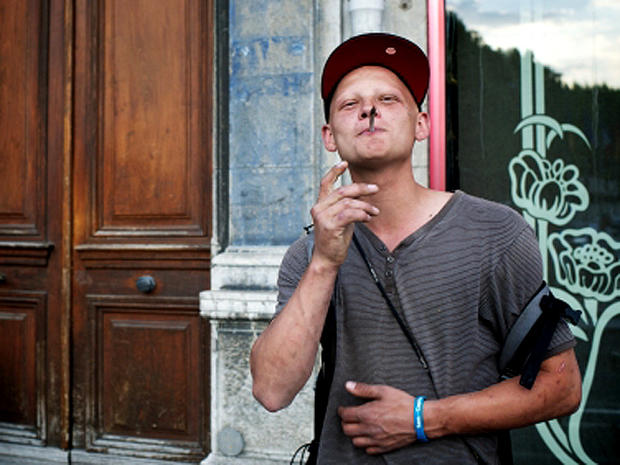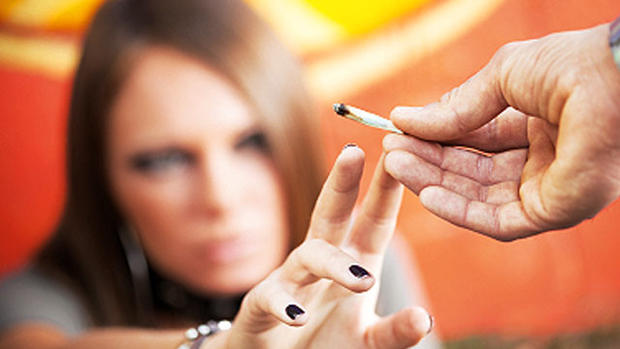Will home drug tests help kids say no to pot on 4/20?
(CBS News) Some teens may think that 4/20 is a harmless stoner holiday to get high, but one concerned mother believes it's the gateway to a dark, drug-addicted path.
To help combat potential drug abuse that may result from smoking marijuana today, Debbie Moak, founder of notMYkid, is handing out home drug tests around the country in order to give parents a way to verify if their kid is drug-free -- and give kids an easy excuse to say no to drugs.
"After a discussion about methods (to say no to drugs), I would introduce the test because it gives accountability," Moak told HealthPop. "A kid could say, 'I can't do drugs because my parents will know.' Just like photo radar deters my speed, having a drug test will have them think twice about accountability."
Univ. of Colorado seeks to curb 4/20 gathering
Marijuana-infused wine produced in Calif.
Moak started notMYkid, a national non-profit organization that focuses on helping parents and kids fight destructive youth behaviors, after a personal battle with her son's drug addiction. At an early age he started using marijuana, which then progressed to a cocaine addiction. She considers herself lucky because she still has her son today and wanted to share what she learned from her experience.
By giving out these drug tests and using them as a positive reward system -- meaning if a kid tests clean they would get more freedoms, additional money or a dinner out -- she believes that parents will be able to stop their kids from taking drugs before they start. From talking to many teens, both who have gone through battles with addiction and others who are fighting peer pressure, she feels that what kids want most these days are for parents to set boundaries.
"If I were simply going to rely on 'I love and trust my kid,' which I did, then stop looking at their grades too," Moak explained. "We understand that, yes our kids can tell us our grades, yes our kid can tell us they are not using drugs, but just like we look at their grades, we need verification," she said.
According to the National Survey on Drug Use and Health, marijuana use among Americans aged 12 and older rose from 5.8 percent in 2007 to 6.9 percent in 2010, totaling 17.5 million American teens and adults. By 8th grade, 15.7 percent of students said they had used marijuana at least once. That number jumped to 42.0 percent by the time they reached senior year.
For teens, the drug can interfere with normal development and affect brain function. The New York Times reported that young adults who started using the drug regularly in their early teens did worst on cognitive tests assessing brain function than those who started smoking when they were at least 16.
Dr. David Rubin, psychiatrist at New York-Presbyterian/Weill Cornell and Columbia, added that marijuana use in teens can help bolster underlying mental illness in kids who are vulnerable to depression and schizophrenia, either by exacerbating the symptoms or bringing them out earlier. It can also lead to impaired judgment.
Rubin agrees that random drug tests can help modify behavior, but it boils down to whether or not the kid believes the parental consequences will outweigh the fun of getting high.
"If there's not a sense that they're not going to do a whole lot about it, then behavior won't change much," Rubin told HealthPop.
He believes parents should be open in their discussions about drugs before problems start.
"Part of what parents need to do is model very consistent behavior and prove to kids that they really do know them and that they study them," Rubin said, "It's very important to kids that their parents really know who they are."
But, Rubin said it's not just marijuana that parents should be afraid of. While marijuana is typically known as a "gateway drug," more kids these days are skipping weed for prescription drugs. Sixty percent of teens say they only use marijuana, with the remaining 40 percent saying they abuse other drugs as well. Many of those kids say they never started their drug history by smoking pot but with other drugs.
"Whatever vigilance a parent might think is needed (for 4/20) should be the same balance that they have every day," he said.
Having a strong parent-child relationship and then introducing a home test can make things awkward, but Rubin believes parents who are drawn to these tests tend to have suspicions that their kid is already using. He said kids who start using drugs do so because they think they can get away with it. More important than just showing up with a test, parents need to show that they disapprove strongly of drug use before they start.
"If you have to ask if they're doing drugs, that's certainly concerning," he said.

